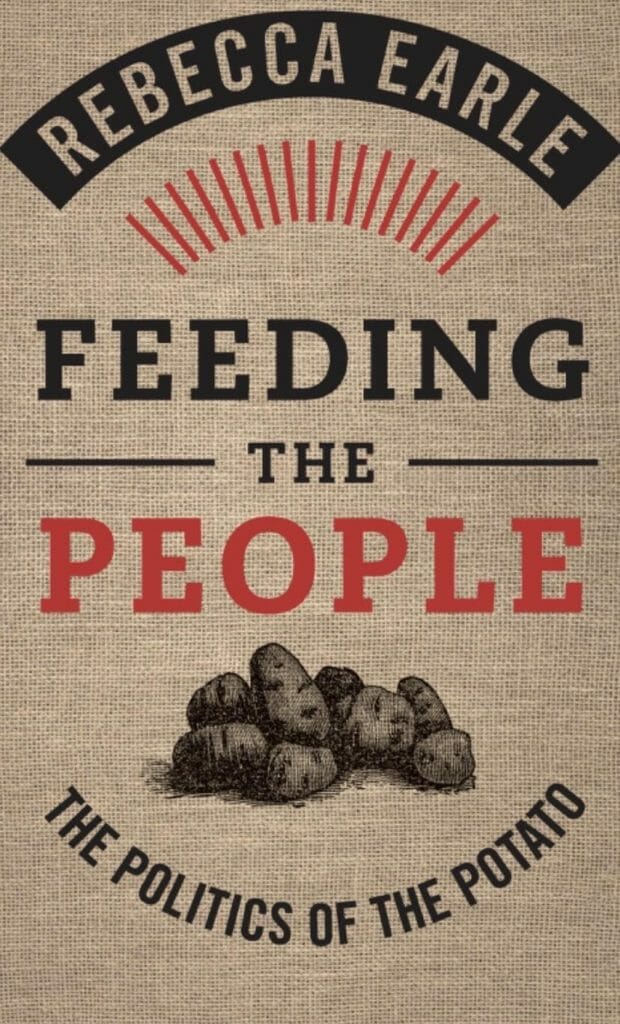New Book Digs Into the Political History of Potatoes
‘Feeding the People’ shows how the staple crop influenced the origins of the modern world.
New Book Digs Into the Political History of Potatoes
‘Feeding the People’ shows how the staple crop influenced the origins of the modern world.

“Feeding the People: The Politics of the Potato,” was released June 25. courtesy of Cambridge University Press
You could cook a potato almost any way and chances are you won’t be disappointed with the result.
But beyond this crop’s versatile charm and nutritional value is an unexpected history deeper than its own roots.
Rebecca Earle knows this best. The food historian and professor at the University of Warwick has spent several years tracing the history of the potato from its early origins in the Andes to the commonly consumed starch that makes it onto kitchen tables around the world.
In her latest book, Feeding the People: The Politics of the Potato, Earle explains the crop’s evolution to become today’s global staple, but also dives into how the vegetable became central to government dietary policy over the years. By tracing the history of the potato, Earle says we can understand how modern diets became what they are.
“Our everyday diets are part of history and there’s a history of how we came to eat the way we do,” she says.
Potatoes made their way to Europe from Peru after the Spanish invaded the Americas in the 1500’s and brought the crop back to their home continent. This was part of the catalyst for its gradual spread into other corners of the world, Earle says.
Potatoes were quietly consumed by peasants for thousands of years in South America, and then in Europe. But it wasn’t until the 18th century that European governments and Enlightenment-era thinkers started taking an interest in what ordinary people were cooking in their kitchens. States began recommending potatoes as ideal crops, Earle says, as they believed the children who consumed the vegetable were particularly resilient.
“European states wanted these hearty robust populations of workers and sailors,” Earle says. “They started to become really interested in whether people were eating nourishing food and whether they could eat food that was a little cheaper, but was still nourishing.”
And at the same time that governments started involving themselves more in peoples’ diets, Earle says the competing idea emerged that the state should leave these dietary choices up to the individual. Earle points to this moment in time as the origin of the debate in contemporary society about how much the government should regulate and control the food we eat.

In the early 20th century, Earle says nutritionists started to abandon their previous focus on proteins as nourishment to adopt a more holistic understanding of nutrition that included potatoes. And during wartimes, governments created whole ministries devoted to figuring out how to keep their populations fed. Potatoes became a big part of these efforts.
In Nazi Germany, potatoes were used as a means to further assert nationalism. Propaganda declared Germans as the “people of the potato,” asserting that eating the crop would make them more German. They attempted to breed potatoes that would thrive in German soil and went as far to determine a list of approved varieties. People were prohibited to grow anything that wasn’t on the list.
In the US, around the Second World War, the government released guidelines stressing the benefits of incorporating ample amounts of potatoes into everyday diets. While President Franklin D. Roosevelt said at the time that this was an attempt to let Americans make informed choices, his government distributed this advice throughout newspapers, radio, magazines and promotional pamphlets.
Earle says that following the history of the potato helps us understand the origins of the modern world. The potato’s story reminds us that innovation doesn’t always come from those named in history books. In the potato’s case, unknown farmers adapted their methods to influence the way we eat. It’s ultimately small farmers like those of the past, who will play a big role in solving the world’s current food security problems, she says.
“Ordinary people can make history,” Earle says. “We may not know their names, but we should be grateful to them. It’s those people we owe for the potatoes of today.”
Feeding the People: The Politics of the Potato was published on June 25.
Follow us
This work is licensed under a Creative Commons Attribution-NoDerivatives 4.0 International License.
Want to republish a Modern Farmer story?
We are happy for Modern Farmer stories to be shared, and encourage you to republish our articles for your audience. When doing so, we ask that you follow these guidelines:
Please credit us and our writers
For the author byline, please use “Author Name, Modern Farmer.” At the top of our stories, if on the web, please include this text and link: “This story was originally published by Modern Farmer.”
Please make sure to include a link back to either our home page or the article URL.
At the bottom of the story, please include the following text:
“Modern Farmer is a nonprofit initiative dedicated to raising awareness and catalyzing action at the intersection of food, agriculture, and society. Read more at <link>Modern Farmer</link>.”
Use our widget
We’d like to be able to track our stories, so we ask that if you republish our content, you do so using our widget (located on the left hand side of the article). The HTML code has a built-in tracker that tells us the data and domain where the story was published, as well as view counts.
Check the image requirements
It’s your responsibility to confirm you're licensed to republish images in our articles. Some images, such as those from commercial providers, don't allow their images to be republished without permission or payment. Copyright terms are generally listed in the image caption and attribution. You are welcome to omit our images or substitute with your own. Charts and interactive graphics follow the same rules.
Don’t change too much. Or, ask us first.
Articles must be republished in their entirety. It’s okay to change references to time (“today” to “yesterday”) or location (“Iowa City, IA” to “here”). But please keep everything else the same.
If you feel strongly that a more material edit needs to be made, get in touch with us at [email protected]. We’re happy to discuss it with the original author, but we must have prior approval for changes before publication.
Special cases
Extracts. You may run the first few lines or paragraphs of the article and then say: “Read the full article at Modern Farmer” with a link back to the original article.
Quotes. You may quote authors provided you include a link back to the article URL.
Translations. These require writer approval. To inquire about translation of a Modern Farmer article, contact us at [email protected]
Signed consent / copyright release forms. These are not required, provided you are following these guidelines.
Print. Articles can be republished in print under these same rules, with the exception that you do not need to include the links.
Tag us
When sharing the story on social media, please tag us using the following: - Twitter (@ModFarm) - Facebook (@ModernFarmerMedia) - Instagram (@modfarm)
Use our content respectfully
Modern Farmer is a nonprofit and as such we share our content for free and in good faith in order to reach new audiences. Respectfully,
No selling ads against our stories. It’s okay to put our stories on pages with ads.
Don’t republish our material wholesale, or automatically; you need to select stories to be republished individually.
You have no rights to sell, license, syndicate, or otherwise represent yourself as the authorized owner of our material to any third parties. This means that you cannot actively publish or submit our work for syndication to third party platforms or apps like Apple News or Google News. We understand that publishers cannot fully control when certain third parties automatically summarize or crawl content from publishers’ own sites.
Keep in touch
We want to hear from you if you love Modern Farmer content, have a collaboration idea, or anything else to share. As a nonprofit outlet, we work in service of our community and are always open to comments, feedback, and ideas. Contact us at [email protected].by Lindsay Campbell, Modern Farmer
June 25, 2020
Modern Farmer Weekly
Solutions Hub
Innovations, ideas and inspiration. Actionable solutions for a resilient food system.
ExploreExplore other topics
Share With Us
We want to hear from Modern Farmer readers who have thoughtful commentary, actionable solutions, or helpful ideas to share.
SubmitNecessary cookies are absolutely essential for the website to function properly. This category only includes cookies that ensures basic functionalities and security features of the website. These cookies do not store any personal information.
Any cookies that may not be particularly necessary for the website to function and are used specifically to collect user personal data via analytics, ads, other embedded contents are termed as non-necessary cookies.